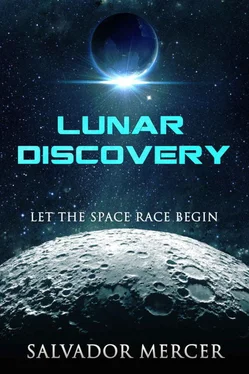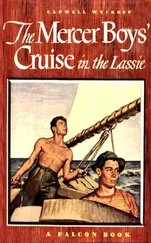“Understood, Director. See to your team. Washington out.” The connection was severed and the screen went dark.
“Did she just say ‘over and out’?” Tom asked from his nearby console.
Rock ignored his impudent mechanical engineer and focused on the task at hand. “Let’s get ready, folks. World crisis or not, we’re finally going to the moon today.”
“You sure about that, boss?” Jack asked.
“As sure as I’m ever going to be. Now let’s roll.” The group broke up and returned to their consoles, awaiting the countdown.
Rock watched as Julie and Craig were strapped in again, the second time in three days, and he listened in as their chief physiologist talked to them in a therapeutic way. Rock could see their vital signs on one of his side screens as they monitored the health and welfare and even brainwave patterns of their astronauts.
“All systems check, integration complete,” he heard Lisa stating over their com system. Rock tugged at the wired headset and wondered when, if ever, they would get the latest in Wi-Fi technology. He still had to “plug in” if he wanted to hear what was going on. There had to be a better way.
During the wait, several Secret Service agents filed into the room and a canine unit swept the area as well. Rock just looked at Mr. Smith, who mouthed the words “vice prez” to explain the activity. At least the president would be watching remotely, and that brought a small level of comfort as the team seemed to be unusually sensitive when they were being observed by the most powerful person on the planet.
Rock knew that the connection with the White House was active from the monitor light displayed on his console, but the reverse feed continued to be shut down. The president would watch them, but they would not see her. Again, probably for the best.
Finally, after what seemed an eternity, the countdown timer rolled to zero, and Rock watched as the bright light of the rocket was automatically dimmed by the high def camera as the first of four million pounds of propellant began to burn. I’d hate to see that fuel bill , he thought to himself.
“Get ready, people,” Rock said. Director Lui had left the center, and Rock could see his boss sitting calmly in the observation room high above the control center. He wasn’t sure who everyone was in the room at this very moment, but it didn’t matter. It was his time to command.
“Houston, this is Canaveral. Apollo 21 has cleared the tower. You have the ball. Confirm,” came the announcement as the bottom of the rocket cleared the top of the launch tower.
Rock clicked his mike open, taking a deep breath. “Canaveral, this is Houston. Confirm, we have the ball. I repeat, Houston has the ball.”
Rock noticed a slight nod from his boss from the corner of his eye before he put it out of his mind. The rocket continued to accelerate as it burned fifteen tons of propellant per second and accelerated at a constant velocity as it slowly started to disappear from sight.
“Commence roll,” the guidance technician said from one of the twenty consoles in the control room.
Rock watched as the rocket started to roll slightly, its gyroscopes now allowing a command to adjust its angle ever so slightly so that it started to cross the Atlantic. The video feed of the interior of the capsule showed both astronauts strapped in, shaking mildly in their seats as over seven and a half million pounds of thrust propelled them skyward.
“Radar shows optimum track,” Lisa said as she monitored her console. Being the integration specialist, she was now supervising eight other system controllers from her desk, feeding relevant data to Marge and Rock’s consoles as well as comparing projected trajectory data versus actual.
“Jeff and his team did a fantastic job, didn’t they?” Marge said via the private channel, interrupting the slow but steady stream of T-plus information as they counted toward the first stage of separation.
Rock clicked his push-to-talk button. “Yes, they did. The rover compartment looks a bit wide on top, but the entire module is quite the feat of engineering, considering the weight.”
“I count almost three times the weight that the Apollo missions had when they took a rover with them,” Marge said.
Rock knew she was referring to the Apollo 15 , 16 , and 17 missions where the astronauts took the mini dune-buggy-looking rover with them. This time their rover had to be bigger, more heavily shielded, and capable of traveling a much farther distance and back than anything that had ever been conceived before. They were counting on technology to give them an edge compared to the old rovers of the late sixties and early seventies.
“Good thing the Saturn can handle the payload,” Rock said, watching the rocket wobble a bit onscreen as the camera had to zoom in on it to keep it visible.
“It’s mainly fuel. We’ve never attempted something like this before,” Marge said. Rock thought she felt nervous, probably because this entire mission profile was her idea.
“Don’t worry, Marge,” Rock said, his voice calm as he tried to display a bit of confidence in her plan as well. “We’ve calced the hell out of this. It will work.”
Marge nodded and cut her mike. After nearly three minutes, it was time for the first separation. Rock almost held his breath as the first stage broke away after burning its entire fuel load of over a half million gallons of kerosene fuel and liquid oxygen, its explosive bolts separating it from the rest of the rocket as it gently glided to the peak of its arch and then began its forty-two-mile trip back to the surface, eventually to land somewhere in the Atlantic.
The second stage took over, attempting to lift the craft into orbit, and Rock watched as the Saturn continued on its trajectory for twice as long as the first stage. After a total of just over nine minutes, Rock watched as the craft approached the African continent and the second stage detached, allowing the third and final stage to ignite and propel the craft to orbital velocity.
“Looking good,” Rock heard Jack say from his console, and it broadcasted on the public channel. One of Marge’s technicians continued to calmly call out data milestones as the craft passed various speeds and distances. He noticed that Marge let out a large breath of air when the second stage separated and the third successfully ignited.
Rock decided to add a human touch to the monotone monologue coming from the data technician. “How you doing up there, Craig?” Rock asked, flipping his push-to-talk on the public channel that the astronauts were using as well.
Craig gave a thumbs-up on the monitor as his bulky gloved hand temporarily released its hold on the chair armrest. “Good.”
“Julie, how are you feeling?” Rock asked.
“Feeling good, Houston. Quite a ride. Give our regards to your crew. This is a fine ship to pilot,” she said.
“We feel the same down here, Apollo . Your telemetry is five by five, and we’ll have you in orbit momentarily. Make us proud.” Rock clicked his mike off and smiled as he got a thumbs-up from Julie as well.
The monotone voice called for final engine shutdown, and the third stage would not be reignited until they had orbited the planet one and a half times. Rock watched as Lisa took the radar readings from Spain and then, thirty minutes later, from India. The craft reached an orbital height of over one hundred miles, and Marge and her crew were calculating the burn ratios from low earth orbit to the moon.
Australia picked up the Apollo 21 craft and then finally Hawaii. Houston would be able to track them across the Western Hemisphere. There was a series of discussions on equipment and vector alignment between Marge and the Apollo as they completed their first orbit of the planet in a single hour.
Читать дальше












